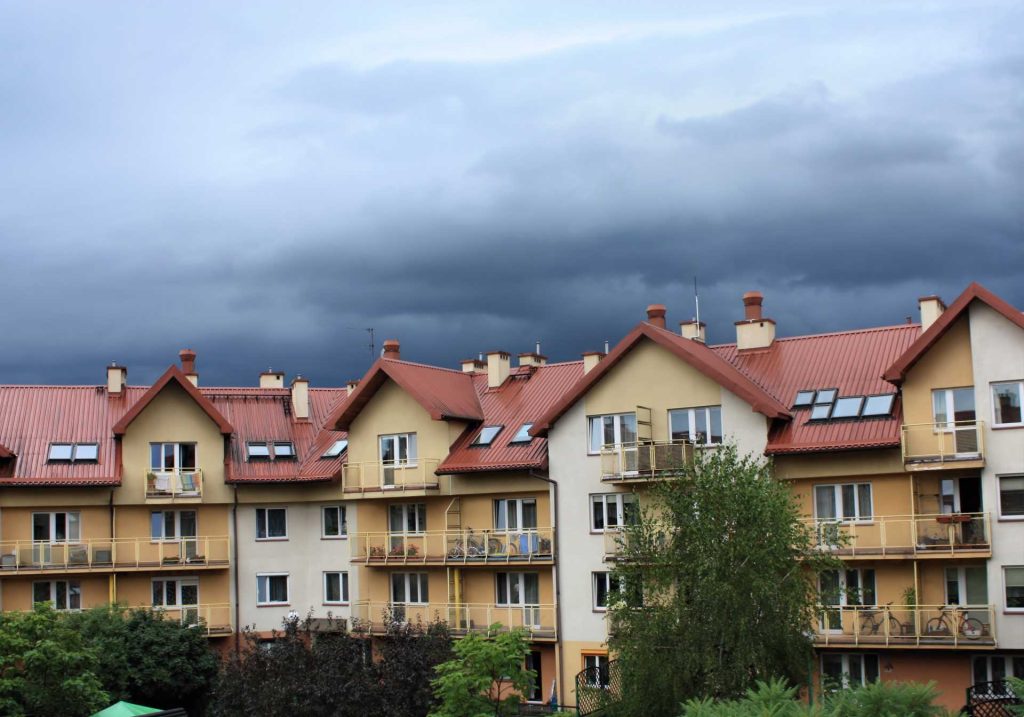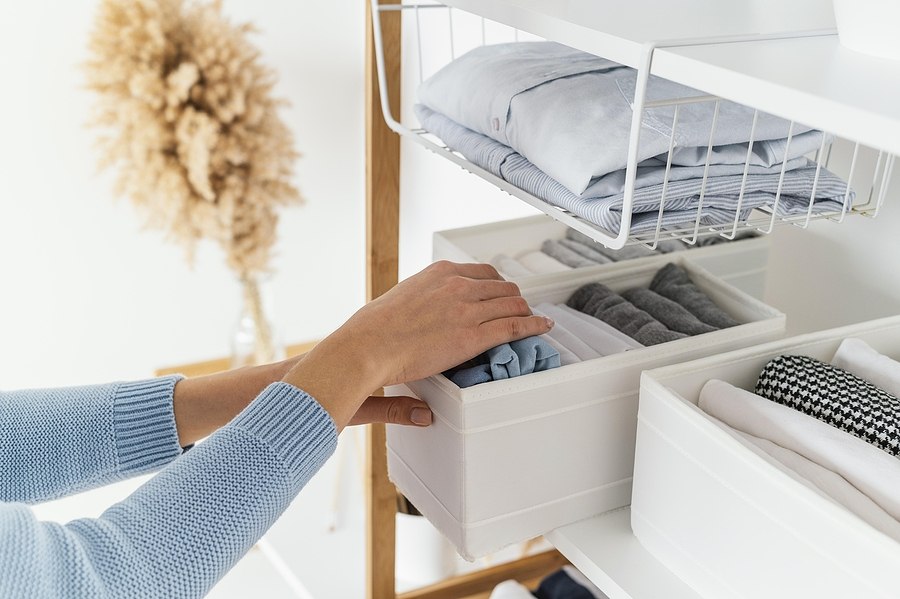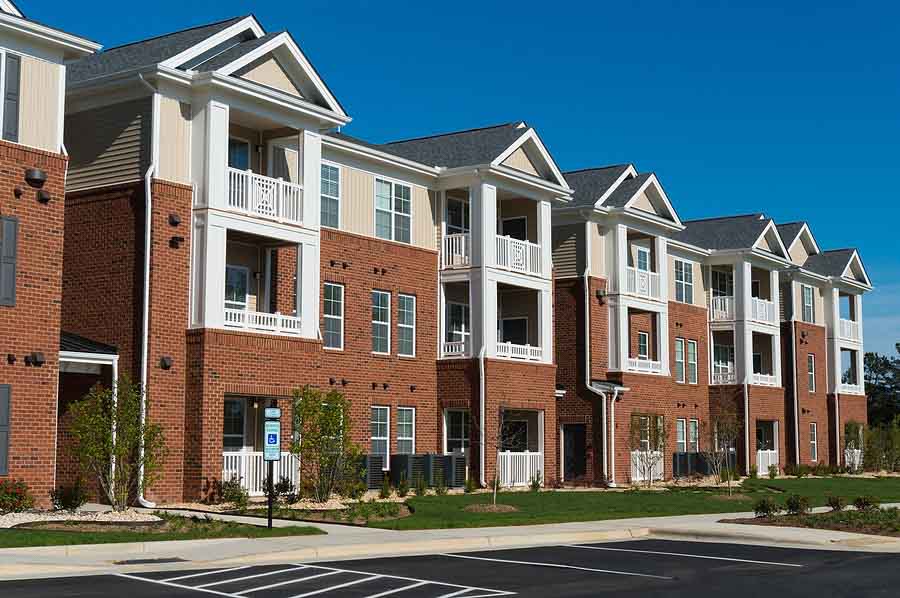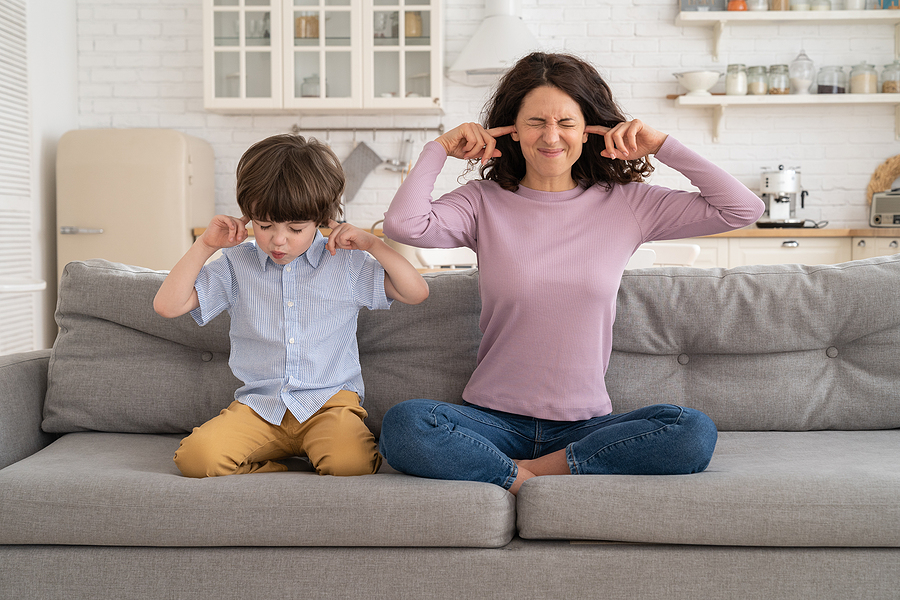Staying Safe During Storm Season

We’ve entered storm season here in the Midwest, so now is a good time to go over some tips for staying safe. In a condo or other high-rise building, there isn’t always a basement or underground parking garage to take shelter in. So, in the case of severe weather, what should you do? No matter if you’re on the top or bottom level, get to an area without windows. You’ll want to get to a room that has as many walls between you and the building’s exterior as possible. Bathrooms or closets are typically the safest options. It’s best to get as low as you possibly can in the building, so get to know your neighbors on the first floor, as you could likely take shelter with them. Your building may have a designated safety area for instances like these, so check with your association. You should also create a safety kit for severe storms in case the power goes out for a long period of time. Include first-aid items, flashlights, emergency contacts, water bottles, and nonperishable food. Checking the weather and knowing when a storm will strike will help keep you safe and give you time to prepare. If you do have covered parking, move your vehicle so that it’s not hit from flying debris outdoors. We hope you stay safe this summer, and we hope for minimal storms!
Tips for Spring Cleaning

Spring is here, the sun is shining, and it’s time to open the windows—that also means it’s time to get out the cleaning supplies! April is a great time to do your spring cleaning, especially after a Minnesota winter where salt and snow have been tracked into the home for months. Because deep cleaning tends to be done seasonally, many allergens get trapped inside during the year, which is tough for those with allergies. A big list of chores can be daunting, so we’ve put together some tips to help you with your cleaning this season. De-clutter and organize. Before grabbing the cleaning supplies, go through your clothes, knick-knacks, and other items that have been sitting in the bottom of a drawer or collecting dust. Organize your jam-packed closet by putting out of season clothes and accessories in bins to help keep it tidy. Create two piles for your unwanted items: trash and donate/give away. Clean room by room. Cleaning tasks can be forgotten if you clean your home at random—instead, tackle your chores room by room. While some people get their cleaning done in a weekend, you may need to spread your cleaning out over a week or two, so make a schedule of what room you’re cleaning on which day. This can lessen a lot of the stress that can come with deep cleaning. Think about air quality. It’s important to replace HVAC filters every couple of months so that you and your family are breathing clean air. Many people open the windows during spring, which lets pollen and other allergens in, so dust frequently to get rid of these extra particles. If anyone in your family suffers from spring allergies, consider adding an air purifier to their bedroom to alleviate those symptoms. Don’t forget about trouble areas. While you may keep a clean and tidy home throughout the year, there are certain tasks that homeowners tend to forget about when handling routine chores. In the kitchen, make sure to wipe down cabinets and shelves, and throw away any old items. It’s also a good idea to clean out the refrigerator and wipe down the exterior and interior. In the bathroom, clean or replace the fan if it’s dusty or performing poorly. If you haven’t recently, change out the interior shower curtain, as this gathers mildew and mold over time. You should also clean those hard-to-reach areas, like behind the toilet. Spring cleaning should feel like a refresh and a breath of fresh air, so don’t stress too much about it. Split up your chores between family members, turn on some music, and get cleaning!
Staying Organized in Small Spaces

Who said spring cleaning had to wait until the warmer months? Winter is a great time to get your home organized. There isn’t typically an abundance of space in a townhome or condo, however, so keeping your space organized can be difficult when there isn’t much room for storage. These tips should help keep your space free of clutter! Get rid of items you no longer use or want. It’s easy to keep accumulating things, and we often don’t notice until there’s too much stuff. Throwing away or donating your unwanted items is the best place to start when getting things organized. Store things upwards. Rather than buying a short, horizontal shelf, choose the tall, vertical shelf that takes up less room. This is a much better way to utilize space! Raise the beds. This is often done in dorm rooms to make more space for storage—by raising the beds, you’ll have space to put totes and other storage items. Keep functionality in mind. Your dresser can likely double as a TV stand in your bedroom, for example! Create zones. The living room doesn’t have to be just a room to hangout in—add a small kitchen table in the corner if there isn’t room for one in the kitchen, or create a home office in an unused area of your bedroom, for example. Use fridge space. The top of the fridge is a great home for cookbooks, pots, bowls, and even decorations. If you have a blender that you use every few weeks, for instance, keep it on top of the fridge rather than taking up counter space. Use the back of doors. Hanging caddies and even simple hooks can help keep a room organized, especially bathrooms with minimal room around the sink. Maximize closet space. If there’s room for it, putting your dresser in the closet can save you a lot of space in your bedroom. Place seasonal clothes in bins and keep them on shelves until it’s time to swap out your wardrobe for the new season! It’s a good idea to de-clutter a few times a year, typically once every season. This prevents the accumulation of unnecessary items and can keep your home looking organized and clean. Just because you have a small space doesn’t mean that you can’t have all the items you need—it just takes a bit of creativity to fit it all in.
Prepping for the Holidays: Inviting Guests

While we’re not quite to the holiday season, it’s a good time to start planning for having guests over. Each association’s rules vary, so check in with your board about the rules surrounding guests. If your townhome or condo has reserved parking spots, let your visitor know where the unreserved spots are. If your building does not have any reserved areas, an overcrowded parking lot can quickly become a problem, especially if visitors are staying for more than one day. Ask your board about parking procedures far in advance so that a solution can be worked out. Community areas can be great spaces to host events, but you’ll need to reserve it in advance. Also, be respectful of your neighbors. Having friends and family over can be fun, but it can often times get a little too loud. Be conscious of your noise level, and quiet down if your neighbors ask you to. Sharper Management hopes you have fun this upcoming holiday season! We’re dedicated to making your HOA an enjoyable place to live.
Summer Noise, Courtesy, and Your HOA’s Rules

Summer is filled with friends, family, fun, and, unfortunately, noise. People are outside later at night in the season of graduation and block parties, and the noise only escalates surrounding the 4th of July with sounds of fireworks. It’s important to be courteous to your neighbors; as the old saying goes, treat others the way you want to be treated. You have every right to have fun this summer, but be aware of your noise level during parties or late nights. Your HOA likely already has rules in place about noise, as issues like barking dogs aren’t unique to any one season. These rules should extend to seasonal noise, like fireworks. In Minnesota, firecrackers and any other sky explosives are illegal. However, even small, legal fireworks make sound, and that noise is accompanied by the sounds of family and friend get togethers. Depending on your HOA, some noise rules may be harder to enforce than others. Talk to your neighbors if any issues arise, and if necessary, bring your concerns to the board. If enough issues arise, the board will take your input into account when revising your HOA’s rules. Always be courteous and respectful, but keep tabs on your noise to make sure you aren’t irritating other residents this summer
New Pets and HOA Living

Since the beginning of the COVID-19 pandemic, pet adoptions have skyrocketed. For companionship and the fact many are working for home full-time, it’s clear this has been the year to get a dog. If you are one of those new puppy owners, you may find these tips helpful in your training journey. Please also note, there are some special considerations for those living in an HOA regarding pet (especially dog) ownership. Training Tips: Establish a potty routine. When potty training a dog, it is important to establish a routine that includes potty times, location, affirmation, and phrasing. Take your puppy our after certain times of day, go to the same part of your yard, give your dog affirmations when they are done, and say a word or phrase that you can eventually use to remind them what to do when distracted. Crate training is essential. Whether you need time to do housework without a puppy underfoot or you are going out to run errands, crate training your dog will help them feel at peace when you are gone. Slowly introduce the crate, then lock them up for short periods of time. When they can go 30 minutes of crate time while you are home without whining, you can start to leave the house. Keep initial trips short, slowly lengthening your time away from home until your dog is comfortable. Leash train your dog. Especially in a shared living community, having your dog used to being on a leash is important. Most communities have rules that animals must be on some type of leash, so by training your dog you will also be adhering to your HOA’s standards. Start leash training by putting the leash on your pet while they are spending time indoors. When they are used to it, start walking your dog around your house so they know what it will feel like and don’t have as many distractions as they would outdoors. Finally, take them outside with their newly developed leash skills! Pets and HOA Living: Please keep in mind your neighbors and the rules of your HOA. Some of the most common complaints regarding pets in an association include: Nuisance behavior. Lack of physical control over your dog, your dog relieving itself on walls or floors of common areas, aggressive and/or dangerous behavior, and conspicuous uncleanliness or parasite infection. Barking problems. If your dog barks continually for a period of 10 minutes or intermittently for a certain amount of time at any time during the day or night, you could be in violation of noise rules. Picking up poop even in winter weather. No one likes to spend more time outside than needed when it’s cold and snowy, but that doesn’t mean you can leave your dog’s poop outside until spring.
